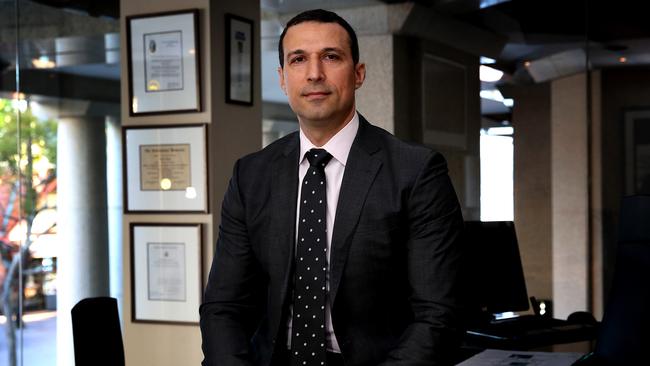Kazal restaurant clan fights ex-partner over ICAC case
The office responsible for NSW’s corruption watchdog will investigate allegations surrounding a multi-million dollar stoush.

The office responsible for NSW’s corruption watchdog will investigate allegations a key witness in a high-profile 2011 inquiry used the threat of Independent Commission Against Corruption proceedings as leverage in a multi-million dollar business stoush.
The Kazal restaurateur family has lodged a highly detailed complaint with the Office of the Inspector of ICAC, claiming its former business partner Rodric David, son of grocery tycoon John David, improperly used ICAC operations to attack him and his family.
Mr David strenuously denies the allegations.
In December 2011, ICAC claimed Mr Kazal had misled the commission about his intention to pay $11,170 for a business flight and accommodation bill for Andrew Kelly., then an employee of the Sydney Harbour Foreshore Authority which leased buildings in Sydney’s Circular Quay to the Kazal family.
ICAC labelled both men corrupt despite it being found all leases were struck on commercial terms. But the Department of Public Prosecutions declined to lay any charges.
ICAC reported it had launched its Operation Vesta based on a single complaint it received on July 14, 2010, and a series of articles which appeared in TheSydney Morning Herald from September 1 that year.
Mr David told the inquiry he had provided the newspaper with information used in those articles, including providing it with a misleadingly cropped photograph which was published prominently.
Less than two weeks after that ICAC complaint, Mr David, via his lawyers, sent Mr Kazal a letter arguing a dispute should be ruled in his favour because Mr Kazal was “at the centre of investigations” being conducted by ICAC.
“Our clients understand Andrew Kelly worked for Deloittes for many years while Mr Kelly was a director of the Sydney Harbour Foreshore Authority (SHFA),” lawyers for Mr David wrote.
“Your clients are at the centre of investigations into irregularities in the tendering process in connection with ...(a) development, which has been the subject of an ICAC investigation.”
The letter was written eight months before Mr Kazal was confidentially informed of Operation Vesta by ICAC and 12 months before it was publicly announced.
Via his lawyers, Mr David said he was not the ICAC complainant, that he did not know the “contents or identity of that complaint” and there was “no evidence” to suggest Mr David was aware of it at the time of the July 27 letter.
“Our client rejects in the strongest terms any suggestion that he has acted improperly in relation to his dealings with ICAC,” Mr David’s lawyers said.
The reference to ICAC, SHFA and Mr Kelly related to an earlier ICAC probe into the Kazal family, they said.
But at the time of the July 27, 2010, letter the Kazals had been officially cleared of any wrongdoing by the NSW government for over seven months and that was public knowledge.
In February, five months before the July 2010 letter, The Daily Telegraph reported the Kazal leasing deal investigated had been “declared fair and above board” by ICAC and quoted ICAC as saying the investigation had ended.
Mr Kazal said Mr David’s assertion that his July letter had referred to that earlier investigation was “completely ridiculous”.
The battle between Mr Kazal and Mr David centred around their former ownership of Sydney’s Global Renewables Eastern Creek waste and recycling facility, now worth over $180m.
Mr Kazal and Mr David bought the company in January 2009 via a company they had created for the purchase, Emergent Capital.
Under the purchase, Mr Kazal and Mr David each held 40 per cent of Emergent Capital and 20 per cent was given to the then manager of the waste facility, David Singh, on the proviso he remain with the company and help it to grow.
At the time of the purchase Global Renewables Eastern Creek was losing about $500,000 a month and Emergent Capital bought it for the nominal price of $1 and took on $40m debt it had accrued.
Ten months later, after two legal battles, the NSW government substantially increased the rate it paid per tonne of waste the facility processed, resulting in the facility delivering a profit of $600,000 a month and making it highly valuable.
Mr Kazal alleges Mr David acted improperly and subsequently effectively removed him from control and ownership of the company, with Mr David and Mr Singh ending up in control of the facility, earning them tens of millions of dollars each.
In comparison, Mr Kazal says his family ended up with about $2.5m from the sale of the facility.
He alleges Mr David encouraged the ICAC and media case against him to assist him in this wrongdoing. Both Mr David and Mr Singh strenuously deny those allegations.
In November 2013 private equity group Ironbridge sold a half stake in the waste facility, valuating it at $180m.
That same year Mr David, a former acting student, founded a Los Angeles movie studio, Thunder Studios, which has 20 production stages and is producing a movie starring Charlie Sheen and Whoopie Goldberg.
In June 2014 Mr Singh bought a $30m harbour-front trophy home on Wolseley Road, the nation’s most expensive street, in Sydney’s Point Piper.
Do you know more? klana@theaustralian.com.au


